Your dog won’t realize it’s a visit from the vet!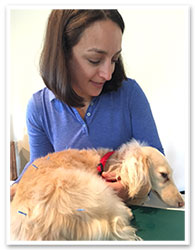
In-home acupuncture for your dog eliminates the stress of going to the vet while allowing Dr. Harrison to see your animal in its everyday environment. Because there is no temperature taking or blood draws involved in Dr. Harrison’s house call, your dog will be happy to see her when she rings the doorbell. Acupuncture in stress-free and comfortable surroundings is ideal for maximizing the benefits of Chinese medicine.
Dog Acupuncture FAQs
Chinese Herbs

What are the benefits of using Chinese herbs?
Chinese herbal medicine is an important adjunct therapy to almost all acupuncture. Combinations of powerful natural ingredients can both enhance the effects of the acupuncture and maximize the amount of time that your animal can go between acupuncture treatments. The Chinese herbal formulas used by Dr. Harrison all come from Jing Tang Herbal, a state-of-the-art and closely regulated facility that produces high-quality veterinary herbal medicine. Through Jing Tang Herbal, Dr. Harrison has access to hundreds of herbal medicines. The herbal formula she selects for your animal depends on the animal’s Bian Zheng—the results of his/her Chinese physical exam.
What form do the herbs come in and will my dog eat them?
Most herbal formulas are used for anywhere between 1 and 6 months.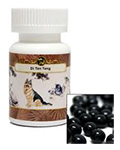 For an acute problem or injury, your animal may only need a short course of herbal medicine. For more chronic problems, herbal therapy may be extended. The Chinese herbs come in several different forms and the form that your animal is prescribed will depend on his/her temperament and appetite. Tea pills are tiny black balls
For an acute problem or injury, your animal may only need a short course of herbal medicine. For more chronic problems, herbal therapy may be extended. The Chinese herbs come in several different forms and the form that your animal is prescribed will depend on his/her temperament and appetite. Tea pills are tiny black balls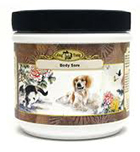 that can be easily hidden in food. The capsule form is an option for more picky eaters and powder is generally reserved for larger dogs and all horses. Many of the more commonly-used herbal medications also come in concentrated forms to ease administration. While goats, camelids and other ruminants can be safely given herbal medication, their unique form of digestion requires a MUCH higher dosage of the herb—this is often cost-prohibitive or impractical.
that can be easily hidden in food. The capsule form is an option for more picky eaters and powder is generally reserved for larger dogs and all horses. Many of the more commonly-used herbal medications also come in concentrated forms to ease administration. While goats, camelids and other ruminants can be safely given herbal medication, their unique form of digestion requires a MUCH higher dosage of the herb—this is often cost-prohibitive or impractical.
Some examples of commonly prescribed herbs:
- Body Sore (good for treating soft tissue injuries, back pain and musculoskeletal problems)
- Shen Calmer (good for calming anxious animals)
- Stasis Breaker (good for slowing tumor growth in stable animals)
- Hindquarter Weakness (good for stabilizing and promoting hind-end strength in dogs with lumbosacral problems)
- Tendon and Ligament Formula (good for promoting healing of tendon/ligament injuries including cruciate tears in dogs)
- External Wind (good for quieting down itchy skin)
- Double P II (good for treating acute intervertebral disc disease)
- Jin Suo Gu Jing/Suo Quan Wan (good for treating urinary incontinence)
- Dok’s Formula (good for treating arthritis, chronic joint pain, hip dysplasia and degenerative joint disease)
Orthopedic/Neurologic
- Arthritis
- Hip dysplasia
- Back pain (including intervertebral disc disease)
- Hind-end weakness
- Cruciate ligament tears
- Acute herniated disc
- Post-operative pain management
- Wobblers
- Seizures
Internal medicine
- Urinary incontinence
- Skin disease and allergies
- Chronic diarrhea (including IBD)
- Cancer (adjunctive therapy to radiation/chemo)
- Kidney failure
- Respiratory problems
- Infertility
- Endocrine problems (including diabetes, hypothyroidsim Cushings)
- Laryngeal paralysis
Behavior
- Separation anxiety
- Aggression
Dr. Harrison has successfully treated numerous feline patients with acupuncture, although they often require professional restraint during the needling process. If your cat isn’t willing be safely needled, it may be a great candidate for “laserpuncture”. Laserpuncture involves stimulating the traditional Chinese acupuncture points with a highly focused cold laser beam for about 1 minute each. There are no needles involved, no discomfort felt and the laser is universally well-tolerated.
Adequan is the only FDA-approved treatment proven to reverse degenerative joint disease. Adequan is a safe and effective therapy and is the only Western medication that Dr. Harrison will start dogs on. Why?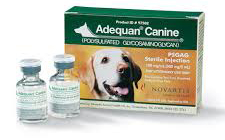 Adequan is an injectable therapy normally given at a single injection site in the muscle. Dr. Harrison uses Adequan for “aquapuncture” whereby she splits a normal dose into multiple smaller doses and injects them at several different acupuncture points. Not only does your dog get the therapeutic benefit of the Adequan, but also the benefit of the Adequan pushing on the acupuncture point, providing a prolonged stimulation. For dogs, there is an initial 1-month loading period during which the Adequan is administered twice weekly. After the loading period, the drug is given every 3-4 weeks and will be tailored to your dog’s acupuncture schedule.
Adequan is an injectable therapy normally given at a single injection site in the muscle. Dr. Harrison uses Adequan for “aquapuncture” whereby she splits a normal dose into multiple smaller doses and injects them at several different acupuncture points. Not only does your dog get the therapeutic benefit of the Adequan, but also the benefit of the Adequan pushing on the acupuncture point, providing a prolonged stimulation. For dogs, there is an initial 1-month loading period during which the Adequan is administered twice weekly. After the loading period, the drug is given every 3-4 weeks and will be tailored to your dog’s acupuncture schedule.
What does Adequan actually do?
- Relieves pain and reduces inflammation in the joint membrane
- Improves joint lubrication and facilitates motion within the joint
- Inhibits noxious enzymes that destroy joint fluid and cartilage
- Stimulates cartilage repair







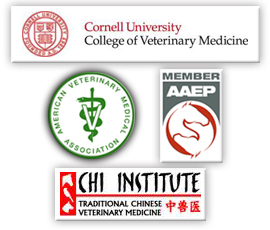 Email:
Email: 
